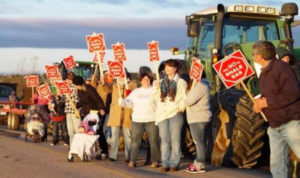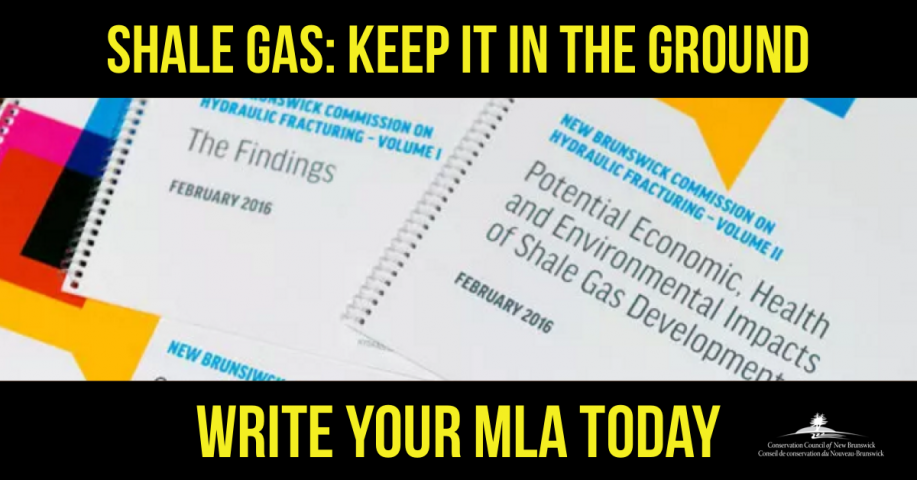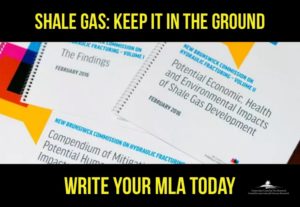[vc_row][vc_column][vc_raw_html]JTNDc2NyaXB0JTIwdHlwZSUzRCUyMnRleHQlMkZqYXZhc2NyaXB0JTIyJTIwc3JjJTNEJTIyJTJGY2NuYi1pbmNsdWRlcyUyRm1sYS1mb3JtLmpzJTIyJTNFJTIwJTNDJTJGc2NyaXB0JTNFJTBBJTNDbGluayUyMHJlbCUzRCUyMnN0eWxlc2hlZXQlMjIlMjB0eXBlJTNEJTIydGV4dCUyRmNzcyUyMiUyMGhyZWYlM0QlMjIlMkZjY25iLWluY2x1ZGVzJTJGbWxhLWZvcm0uY3NzJTIyJTNF[/vc_raw_html][vc_column_text]
We need to speak up for the health and safety of New Brunswickers.
Premier Blaine Higgs says his minority Progressive Conservative government will end the province-wide moratorium on hydraulic fracturing and allow the controversial and risky process in the Sussex region. And Premier Higgs wants to do it fast — before the New Year.
Use your voice to let the Premier know this is bad public policy. The Conservation Council has launched an easy-to-use letter-writing tool so you can have your say on fracking to your local Member of the Legislative Assembly, Premier Higgs, and all political party leaders.
Use the form below to send our pre-written letter (which you can edit freely) today.[/vc_column_text][/vc_column][vc_column][/vc_column][/vc_row][vc_row][vc_column width=”1/6″][/vc_column][vc_column width=”2/3″]
Why should I send my #noshalegas letter?
New Brunswickers know that climate change is here, now, and already impacting our communities. It is time to diversify our energy toward the huge potential of renewable sources and turn the page on the fossil fuels causing climate change and impacting our health.
Fracking is not worth the risks it poses to our drinking water, our environment, or our health and safety.
There are now more than 1,300 scientific studies, journalistic investigations and government regulatory reports on every aspect of shale gas extraction. The overwhelming majority of them substantiate the threats that the industry poses towards public health, water and the environment, and climate change.

Climate change
Burning oil, coal and gas is not good for our health. These energy sources pollute the air we breathe, contaminate the water we drink, and unbalance the climate we depend on. Renewable energy using solar, wind, hydro or other technologies is a clean way to deliver the power we need. Renewing our energy system lowers air pollution, protects water, and helps slow climate change. The good news is that we have what it takes to renew our energy system.
This is where the good jobs are headed. Canadians know energy, and we have the can-do attitude and skills needed to build the renewable energy system almost all Canadians want. The most competitive economies are heavily investing in their clean energy sectors. Shifting to more energy-efficient and clean forms of renewable energy to power our economy is the surest way to maintain Canadian jobs and create new economic opportunities for New Brunswickers. Our province can accelerate the renewal of its energy system by developing its abundant renewable energy sources. And, in doing so, we join the growing group of forward-thinking jurisdictions creating opportunities for workers, businesses and communities.
Water and air pollution
Methane, fracking fluids and other drilling chemicals have been proven to enter waterways via leaking wells, spills, pipeline breaks, well blowouts, truck accidents and floods. In addition to making water wells undrinkable and causing illnesses, contaminated waters have killed farm animals, wildlife, fish, vegetation and have left farmlands unusable.
Many studies have linked airborne illnesses to density and nearness of gas wells, some documenting problems up to 4km from wells. Because airborne pollution can be inhaled, swallowed, and also reach the skin, it has emerged as one of the primary public health concerns. Other shale gas chemicals have created ground-level ozone over 300 km from the source, aggravating asthma, respiratory diseases and causing irreparable lung damage.
These are just a few of the risks fracking poses to New Brunswickers. To learn more, check out these helpful resources:
Recommended resources:
- Commission’s Fracking Report Shows Moratorium Remains Smartest Policy And Time Is Right To Begin New Brunswick’s Transition to Low-Carbon Economy
- Statement on Report From New Brunswick Commission on Hydraulic Fracturing
- Study shows fracking moratorium remains smart public policy
- Quick facts on hydraulic fracturing
- Shale gas myth busting
- Articles from the New Brunswick Anti-Shale Gas Alliance
[/vc_column_text][/vc_column][/vc_row]


